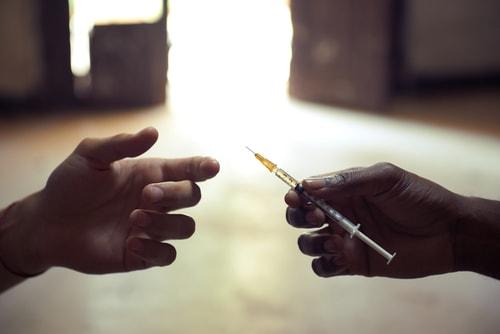Drug Overdose Prosecution: Sharing Drugs Could Land You in Serious Trouble
 The United States is in the midst of a horrific crisis related to drug abuse. The problem is so widespread that it is largely known as an epidemic. On an average day, about 115 people in the U.S. die as the result of an opioid overdose. Opioids include prescription pain relievers like Vicodin and OxyContin, as well as heroin and fentanyl. According to the Centers for Disease Control and Prevention (CDC), the financial cost of prescription opioid misuse—not included illegal drugs like heroin—is about $78.5 billion annually.
The United States is in the midst of a horrific crisis related to drug abuse. The problem is so widespread that it is largely known as an epidemic. On an average day, about 115 people in the U.S. die as the result of an opioid overdose. Opioids include prescription pain relievers like Vicodin and OxyContin, as well as heroin and fentanyl. According to the Centers for Disease Control and Prevention (CDC), the financial cost of prescription opioid misuse—not included illegal drugs like heroin—is about $78.5 billion annually.
There are two primary philosophies when it comes to dealing with America’s drug problem. The first is more draconian, and it involves harsh criminal prosecution for those who use, sell, and manufacture illegal drugs, as well as those who use otherwise-legal prescription drugs in illegal ways. The second, one could argue, is more compassionate, and it involves treating substance abuse like a disease. Laws across the country seem to bounce back and forth between the two sides when it comes to individual drug users, but when an overdose death occurs, the prosecution philosophy often takes over.
Could You Be Considered a Drug Dealer?
The common definition of a “drug dealer” is a person who offers illegal drugs in exchange for cash. According to Connecticut law, however, the exchange of money is not required for a person to be found guilty of selling drugs. A sale can also include drugs offered as a gift. But, what does this mean? In effect, it means that if you obtain illegal drugs and share them with someone else, you could be found to have “sold” the drugs to the other person—even if you were using them together.
This is a very important distinction because a person who sells drugs that cause a fatal overdose could be held criminally responsible for the death. In several states, specific laws have been passed to allow for the prosecution of “drug-induced homicide” as a separate charge. In Connecticut and other states without such laws, prosecutors may use existing murder and homicide laws to build a case.
“You Owe Me”
A recent article in The New York Times looked at some of the overdose prosecutions taking place around the country. The article included interviews with several prosecutors who seem convinced that they are doing the right thing by seeking what they see as justice for overdose victims. Some say that prosecution helps reduce the flow of drugs in their cities and that criminal charges help deter drug use. Others admit that such prosecutions are meant more for the families who have lost a loved one to a drug overdose.
“I look at it in a real micro way,” said one prosecutor from Minnesota. “You owe me for that dead kid.”
Facing Drug-Related Charges?
Unfortunately, there are no simple solutions to America’s drug problem. As public health officials and lawmakers continue to look for answers, the police continue to make drug-related arrests. If you have been charged with any type of drug crime, contact an experienced Connecticut criminal defense attorney for help. Call 860-290-8690 for a free, confidential consultation at Woolf & Ross Law Firm, LLC today.
Sources:
https://www.jud.ct.gov/JI/criminal/Criminal.pdf
https://www.nytimes.com/2018/05/25/us/drug-overdose-prosecution-crime.html?rref=collection%2Fsectioncollection%2Fus






